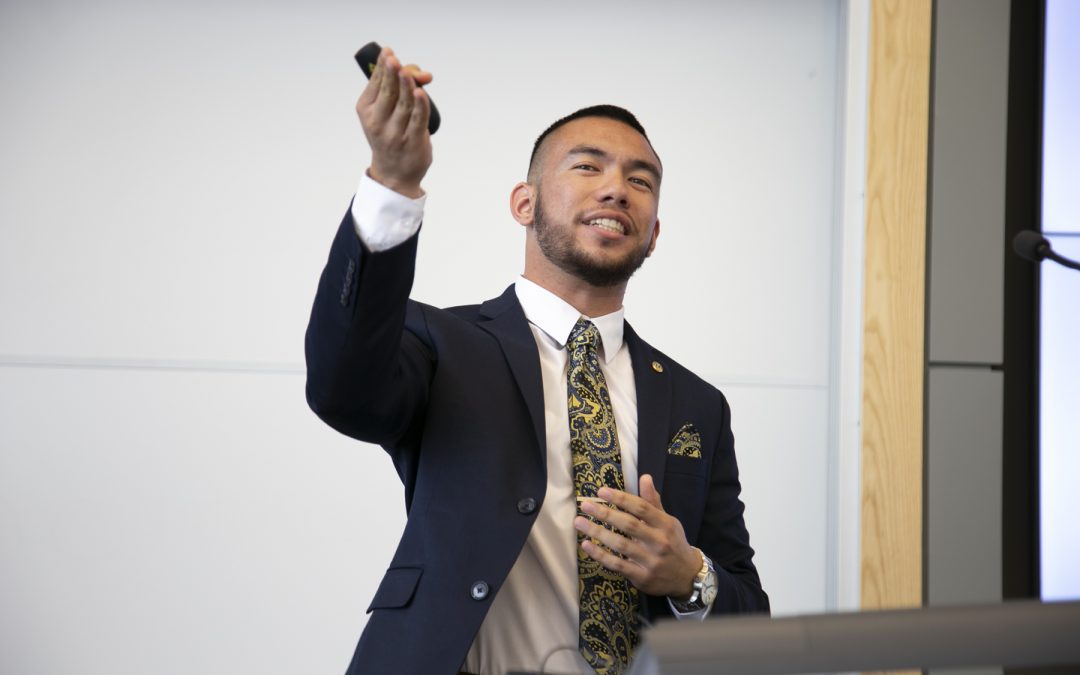Erick Aguinaldo served as a father figure from a very young age. Growing up in a single-parent household, Aguinaldo quickly found himself helping his mother by co-parenting his two sisters, five and 13 years younger than himself. The added responsibility gave him a window into how women navigate the world rarely afforded to young men of his age. He paid attention when his mother was catcalled or stared at by men on the street and, subconsciously in keeping with how men were portrayed in the media he was consuming at the time, he would stare back at them in challenge.
Even as his family provided him with strong female role models, Aguinaldo’s high-school years found him in what he calls “hypermasculine” spaces, like sports, where he and his peers were caught up in the pursuit and objectification of women as they explored their own developing sexual identities. At his core, however, this never sat well with him.
“That time in my life created a lot of cognitive dissonance for me, because I didn’t want my mom or sisters treated that way,” Aguinaldo says. “I had to ask myself why I was I doing it. Ultimately I felt I was doing and saying things I didn’t necessarily want to, just to fit into what I saw as the masculine norm.”
In Search of Answers
This introspection followed him to college, where Aguinaldo began studying psychology with the aim of becoming a counselor. During his studies, he was introduced to the research side of the field, and its promise of helping him find answers to many of the questions he continued to have around gender norms, where they came from, and how they were communicated. As he accumulated research experience wherever he could find it, he enrolled in the McNair Scholars Program, which focused on helping students from underprivileged backgrounds get into doctoral programs.
“I’d been building up all these questions, and at the same time had become more comfortable with who I was instead of putting up this front of hypermasculinity,” Aguinaldo explains. “My first research project was centered around sexual objectification and drew heavily from the field of women’s and gender studies, and that ended up being a good lens for all of my later work.”
Around the same time, the #MeToo movement continued to gather momentum and bring the issues of sexual assault and gender inequality to the forefront of public discourse. Numerous rich, influential men in entertainment, business, and politics were facing accusations of sexual violence, some going back years or even decades. One account that drew Aguinaldo’s interest, however, came from the opposite direction of most #MeToo stories. In 2017, actor and bodybuilder Terry Crews began publicly talking about his own experience with sexual assault. It was a mold-breaking admission from one of Hollywood’s leading strongmen, one that would alter the focus of Aguinaldo’s research.
“I was interested in how other men might receive what he had to say, and it turned out to be generally accepted,” Aguinaldo says. “I wondered if it was because he embodied so many stereotypically masculine characteristics, and if his message would have had the same effect if it came from a man who didn’t.”
Summer of Opportunity
As one of only two universities in the United States to offer a joint Ph.D. in psychology and women’s and gender studies, the University of Michigan had long been at the top of Aguinaldo’s list of graduate schools. When the chance came to work with U-M scientists during the Summer Research Opportunity Program (SROP), he jumped at it.
During SROP, Aguinaldo spent eight weeks working with Robin Edelstein, associate professor in the Department of Psychology. He combed through open data sources, like blogs, to study word use among trans men, with a particular eye toward whether or not they were trying to live up to a similar standard of masculinity that Aguinaldo experienced in his own youth. They ultimately presented their work at the Society for Personality and Social Psychology Conference in Portland, Oregon.
The relationships he forged during SROP were even more valuable than the research experience. In addition to being able to form friendships with his cohort of fellow SROP participants, Aguinaldo took full advantage of his time at U-M by meeting as many faculty and graduate students as he could. These included Terry Conley, associate professor of psychology, as well as Arthur F. Thurnau Professor of Psychology L. Monique Ward, who now serves as Aguinaldo’s faculty advisor.
Following his SROP experience, Aguinaldo has continued his academic journey at U-M, becoming a new graduate student in the Joint Program in Women’s Studies and Psychology this year. He is continuing his research into media and masculinity. Upon completing his program, he aims to pursue his research interests further as a professor. He hopes his work will demystify gender stereotypes and help people feel more comfortable being who they are.
“It’s really important to me to be doing something that will help my sisters live in a better world than the one I grew up in,” Aguinaldo says. “I hope by helping young men explore these questions, we can have more transparent boys and men who don’t feel caged by a certain type of identity being forced onto them.”
How Rackham Helps
In addition to participating in SROP, Aguinaldo has attended multiple Rackham professional development workshops, including ones focused on writing a CV and becoming a more competitive academic job applicant. He has also participated in interdisciplinary workshops focused on Latinx issues, which helped him make the transition to Ann Arbor.
“The whole SROP program was a huge benefit for me, it was the pipeline that got me here,” Aguinaldo says. “Ann Arbor is also culturally very different from where I come from, and many of the Rackham workshops provided an empowering space where I felt at home and welcome in an area where I often feel out of place.”

